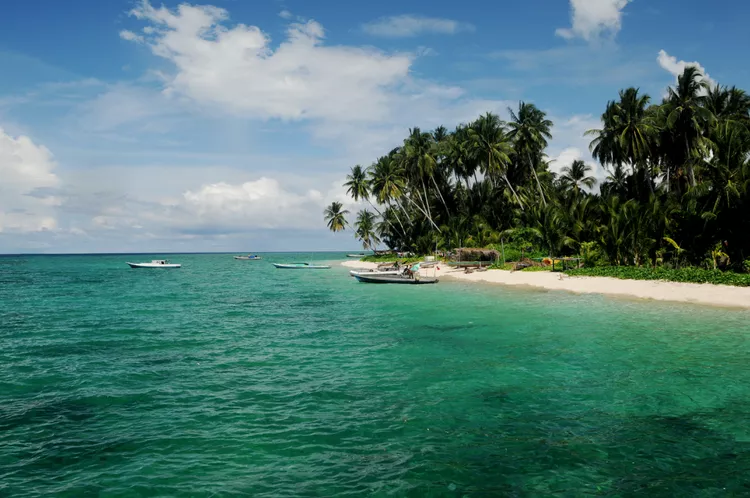Summary of the Derawan Islands
Derawan Islands: A Guide to the Hidden Gem of Borneo
The Derawan Islands in East Kalimantan host one of the most vibrant ecosystems in Borneo. With a chance to observe awe-inspiring marine life such as giant mantas, whale sharks, dolphins, and endangered sea turtles, this destination is an unforgettable experience for nature lovers. Although reaching the islands requires time and effort, visitors will find rewards well worth the wait.
Planning Your Trip
- Best Time to Visit: The Derawan Islands experience rainfall year-round; however, July, August, and September are generally the driest months. Moreover, weekends tend to see larger crowds.
- Language: The national language is Bahasa Indonesia, but the local Bajau people speak their own Indonesian Bajau dialect. Most tourism workers also speak some English.
- Currency: Indonesian rupiah (IDR) is the local currency. Prices are noted as “Rs” or “Rp” preceding the amount.
- Getting Around: Travelers navigate between islands via speedboat rides that can be bumpy. Although Maratua Island has a few scooters and small trucks, cycling offers an enjoyable means to explore. The small Pulau Derawan can be easily walked around in about an hour.
- Travel Tip: For those visiting, most food and supplies are brought from the mainland by boat. Prices tend to be higher on the islands, and options may be limited. Plan to bring essential items with you.
:max_bytes(150000):strip_icc():format(webp)/green-sea-turtle-swimming-in-derawan--kalimantan--indonesia-underwater-524923999-9ea2e4f752d4420eb1f1d91301ebba0b.jpg)
Things to Do
In the Derawan Islands, it is important to respect marine life. Refrain from engaging in harmful activities such as feeding whale sharks or handling jellyfish and baby turtles for photos. Fortunately, there are numerous responsible ways to appreciate the vibrant marine biodiversity.
- Go Diving: The Derawan Islands are part of a coral triangle recognized for its exceptional marine biodiversity. Travelers can encounter everything from giant mantas to tiny pygmy seahorses. Dive shops typically provide accommodation packages.
- Visit Sangalaki Island: A popular excursion includes visiting Sangalaki Island, renowned for its sea turtle sanctuary. This location offers the chance to snorkel where manta rays often visit.
- See the Sea Turtles: Keep an eye out for green and hawksbill sea turtles while snorkeling or walking on the beaches. Nesting areas and eggs may also be spotted.
- Swim with the Jellyfish: Kakaban and Maratua islands offer brackish lakes featuring jellyfish that have lost their sting, allowing for unique swimming experiences.
- Explore by Bicycle: Renting a bicycle on Maratua Island enables visitors to experience local life and scenery. While cycling on sandy roads, be cautious of monitor lizards and mischievous macaque monkeys.
What to Eat and Drink
Seafood is a popular choice when dining in the Derawan Islands; however, ocean views from restaurants do not always ensure freshness. Pay attention to busy restaurants, as fish quality can vary.
Meals typically include rice by default. Common dishes include chicken, fish, and eggs, while vegetarians can enjoy tempeh, often stir-fried with sambal. Western cuisine is also available at various establishments.
Fresh coconuts serve as an excellent way to stay hydrated, particularly in the tropical heat. Unfortunately, the islands have a plastic bottle issue, so consider any refill options offered at your accommodation.
:max_bytes(150000):strip_icc():format(webp)/indonesia--derawan-island--east-kalimantan-136506641-273f023c9b68482697fe6efa5112ed92.jpg)
Where to Stay
Accommodations are more affordable on Pulau Derawan, the most developed island. Conversely, Maratua Island offers a pricier yet beautiful experience.
While booking sites list resorts and diving establishments, visitors can find local homestays upon arrival, providing an opportunity for cultural immersion.
Getting There
Unless you manage to find a rare flight to Maratua Island (TRK), reaching the Derawan Islands requires flying, riding minibuses, and taking boats. Weather conditions can lead to delays, so maintain flexibility in your travel plans.
Option 1: Fly into Kalimarau Airport (BEJ), located 6 miles from Tanjung Redeb in Berau. From there, take a taxi or shared minibus to Tanjung Batu (approximately three hours), followed by a boat ride to Derawan or Maratua Island (around 45 minutes).
Option 2: Fly into Tarakan in North Kalimantan (TRK) and then take a four-hour boat to Derawan Island, which minimizes ground travel time, although the boat ride may be costly and uncomfortable.
Keep in mind that speedboat rides may be bumpy. Protect your belongings and consider sea sickness remedies, such as Dimenhydrinate for travelers prone to discomfort.
Culture and Customs
- Learning a few phrases in Bahasa Indonesia is encouraged, although not all inhabitants may speak it; the Bajau people have their own dialect. Friendly locals often assist with translations during excursions.
- Domestic travelers in Indonesia are often eager to engage with international visitors, so expect group photo requests!
- When leaving the water, remember to dress modestly. The cultural norms are more conservative, and showing skin in public areas may be frowned upon.
- Experiencing home-cooked meals in local family homestays is often a cherished memory, with communal dining practices being customary. Use your right hand to eat and wait for the eldest to start their meal before you dig in.
Money Saving Tips
- Weekends draw Indonesian travelers, leading to busier accommodations and tour services. Nonetheless, teaming up with fellow travelers can lower costs for shared boat rides.
- The Derawan Islands experience an influx of visitors during Chinese New Year and local holidays. Be prepared for accommodation challenges during these times.
- Maratua Island has a bank with an ATM, but Derawan Island’s ATMs may have technical issues. Bring sufficient cash for your stay to avoid unnecessary inconvenience.
- Dining at local warungs on Derawan Island offers more budget-friendly meal options compared to guesthouse food.
- Tipping is not a widespread practice, so guests do not need to feel obligated to tip while visiting the Derawan Islands.




